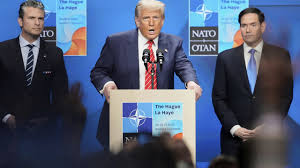Trump says US to hold nuclear talks with Iran next week amid Israel-Iran ceasefire

In a surprising shift from confrontation to diplomacy, former U.S. President Donald Trump has announced that the United States is preparing to hold nuclear talks with Iran next week. The revelation comes at a critical moment, just as a temporary ceasefire between Iran and Israel takes effect after nearly two weeks of intense cross-border violence.
Trump, speaking at a media briefing during a NATO policy roundtable, stated that senior U.S. officials will engage Iranian representatives in what he called “a time-sensitive conversation to halt nuclear escalation and restore regional stability.” He emphasized the importance of diplomacy while also warning that Washington will “remain vigilant and prepared to respond to threats.”
A Ceasefire Holding—For Now
The recent ceasefire agreement between Iran and Israel follows a dangerous escalation that had many global observers fearing a full-scale regional war. Over the past two weeks, Israeli cities faced waves of Iranian missile strikes, while Israeli forces conducted high-impact retaliatory airstrikes, reportedly targeting Iranian nuclear infrastructure.
While the ceasefire has largely held since its announcement three days ago, the atmosphere remains tense. Civilians on both sides remain on edge, and military readiness remains high. Intelligence reports suggest that while the ceasefire has paused active attacks, both nations are quietly repositioning forces and recalibrating strategies.
In this volatile context, the announcement of nuclear negotiations is both surprising and strategic.
Trump’s Strategy: Carrot, Stick, and Stagecraft
Trump’s move marks a calculated attempt to reshape the narrative. After previously authorizing military action that U.S. officials claimed “delayed” Iran’s nuclear ambitions by only a few months, Trump is now emphasizing diplomacy over destruction.
“We’ve made it very clear—we won’t tolerate nuclear blackmail. But we’re also not looking for endless war,” Trump said. “These talks give Iran a chance to step back from the brink.”
While he did not disclose the exact location or participants of the talks, sources within the administration suggest neutral European territory—possibly Switzerland or Austria—may host the meeting. The U.S. will reportedly be represented by a mix of current State Department officials and international policy advisors close to the Trump campaign.
Iran’s Reaction: Mixed Signals and Nationalist Pressure
Iran has not officially confirmed its participation in the upcoming talks. State media outlets have largely ignored Trump’s announcement, focusing instead on parliamentary legislation that aims to suspend cooperation with the International Atomic Energy Agency (IAEA).
This legislation is seen by many analysts as a reaction to Israel’s recent airstrikes, which are believed to have damaged or destroyed key nuclear facilities. Iran’s hardliners argue that international oversight failed to protect the country’s sovereignty and nuclear progress.
Still, behind the scenes, Iranian diplomats are reportedly weighing the benefits of temporary engagement. The economic toll of sustained conflict, coupled with rising public dissatisfaction, may be pushing Tehran toward a pragmatic, if temporary, thaw.
“The Iranian leadership wants guarantees—sanction relief, non-aggression pacts, and respect for sovereignty,” says Dr. Nasrin Alavi, a Tehran-based political analyst. “They don’t trust Trump, but they may see the talks as a way to buy time and rebuild defenses.”
Global Reactions: Europe, Russia, China Weigh In
The news of impending talks has prompted varied reactions from global powers. The European Union welcomed the announcement, with EU foreign policy chief Josep Borrell stating that “diplomacy must always be the first option, even in moments of crisis.”
Russia has remained cautious, calling for “balanced, respectful” dialogue while warning against U.S. attempts to isolate Iran. China, on the other hand, has encouraged both parties to “show flexibility” and avoid disrupting global oil markets, which have already seen price spikes due to the conflict.
The United Nations has also urged full transparency and called on both Iran and the U.S. to allow the IAEA to resume inspections without restrictions. “We cannot negotiate peace in the dark,” said UN Secretary-General António Guterres.
Domestic Response in the U.S.: Divided Lines
In Washington, Trump’s announcement has drawn mixed responses. Republican allies praised the move as a bold diplomatic gamble that showcases strength and restraint. Senate Minority Leader Mitch McConnell called it “a high-stakes but necessary outreach.”
Democrats, however, remain skeptical. Former Secretary of State Antony Blinken warned that without concrete commitments and a return to the 2015 nuclear deal framework, any progress could be short-lived. “Talks for the sake of headlines are not a strategy,” he said.
Polls show American voters are cautiously supportive of peace efforts but wary of prolonged engagement in Middle Eastern conflicts. With elections on the horizon, Trump’s handling of Iran may become a central talking point in the upcoming campaign.
What’s at Stake?
At the heart of the upcoming talks is a singular question: Can diplomacy prevent Iran from pursuing nuclear weapons capability without another devastating war?
For the U.S., success would mean avoiding further entanglement in Middle Eastern conflict while curbing nuclear threats. For Iran, it could provide a pathway to easing sanctions and rebuilding a strained economy.
But for peace to last, both sides must agree to mutual concessions, allow verifiable inspections, and maintain open communication. The alternative—a return to military escalation—would likely plunge the region into deeper chaos.
Conclusion
As the world watches with bated breath, the U.S.-Iran nuclear talks scheduled for next week represent both a risk and an opportunity. In a region teetering on the edge, diplomacy remains the best hope for de-escalation. Whether the ceasefire will hold, and whether Iran and the U.S. can rebuild even a threadbare trust, remains uncertain—but this new round of talks may be the most important in years.






